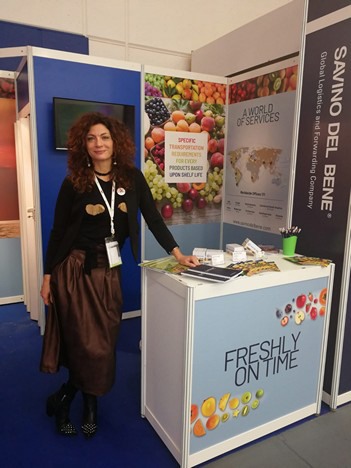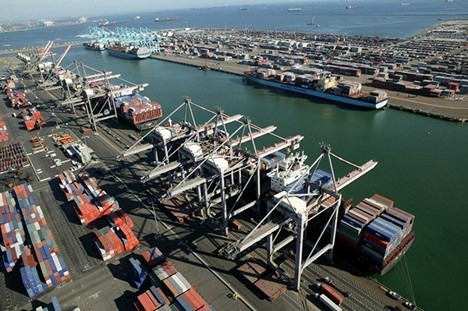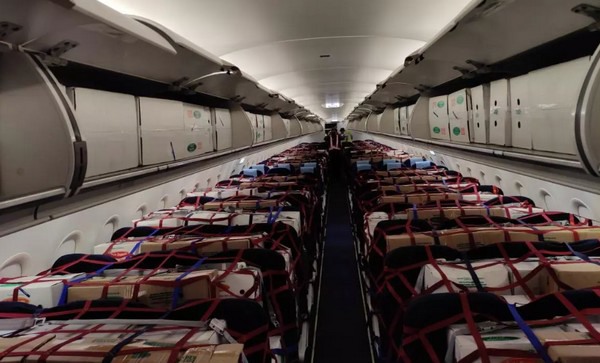Over the past few months, the entire logistic and haulage sector has been dealing with the serious and unexpected consequences of the Covid-19 pandemic. FreshPlaza has talked about it with Linda Carobbi, Corporate director for the Fresh Fruit and Vegetable Vertical Market at global logistics and shipping company Savino Del Bene S.p.A.. Linda has recently obtained the Innovation Manager Certification for Digital Transformation and Change Management.
 FreshPlaza (Fp): What is the situation of logistics on an international level?
FreshPlaza (Fp): What is the situation of logistics on an international level?
Linda Carobbi (LC): When it comes to maritime transport, shipping companies have started returning hired ships in an attempt to mitigate costs. Things will probably escalate over the next three months due to the black sailings sequences planned for the main trade routes leading to a reduction of the market that could reach 20% of the total tonnage (trend started in January 2020 and still underway). Maritime carriers are therefore trying to get rid of chartered container ships, which generally represent a considerable percentage of ships for each carrier. This reduction in the hold capacity available could lead to tensions when it comes to ocean freight, with probable consequences on the freight level of some trades.
FP: How are things in Italy, also when it comes to reefer container traffic?
LC: They are used for commodities such as fresh fruit, foodstuffs and pharmaceutical products, i.e. goods that were generally not affected by the drop in international trade deriving from Covid-19. At the start of the pandemic, shipping companies applied a series of Peak Season Surcharges to deal with the higher costs deriving from the Chinese lockdown and the fact that reefer containers were stuck in Chinese ports.
The situation has slowly gone back to normal and we can now say that the costs of reefer container ocean freights to export fresh fruit to Egypt and the Middle East have gone back to pre-emergency levels (December 2019-January 2020) and have even dropped a little in some cases due to the lower cost of oil. Savino Del Bene is among the top players in Italy when it comes to the import/export of fresh fruit. We monitor the situation also thanks to our excellent relations with various carriers, which have been supporting us for years.

FP: What was the reaction to the emergency?
LC: In Italy, Covid-19 favored Digital Transformation. For example, the ports of Genoa and Savona Vado have recently defined guidelines for the "Digitization of traffic flows at port access points and terminals" to help with the difficulties caused by the health crisis.
Digitization was identified as a tool to improve and facilitate accessibility, keeping better track of incoming and outgoing goods. The main innovations found in the guidelines concern the exchange of digitized documents and the availability of a mobile app to operators so they can "announce" their arrival at the terminal. We hope this unavoidable digitization process can be ready in the shortest time possible.
 Source: Willy Boulter on LinkedIn
Source: Willy Boulter on LinkedIn
FP: And what about air transport?
LC: The impact on the sector has been very strong: in early May, Istat defined the consequences of Covid an "unprecedented crisis" for air transport. Two flights out of three were cancelled in March, with an 85% drop in passengers. The Coronavirus has grounded most airplanes all over the world. At the end of March, IATA (International Air Transport Association) estimated the damage for the air sector at around $252 billion, i.e. 44% on an annual basis. Practically all air carriers have reconverted most of their passenger flights into cargo flights by removing the seats.
Those same airplanes that used to seat hundreds of passengers are now transporting products destined to be exported. Without seats, there is more room for goods that usually travel beneath the feet of passengers. It is medicinal products in particular (masks, ventilators, etc.) that are transported to make them reach their destination faster. As of April 3rd, Savino Del Bene has been providing frequent charter services from China to Europe to supply medical and personal protection equipment to deal with the health emergency.
FP: What about fresh produce shipments?
LC: It has been more difficult to ship anything other than medical equipment by air and costs have generally doubled. Just think that one of our clients recently asked us to assess the feasibility and cost of shipping fresh blueberries (at a controlled temperature) from Malpensa airport to Hong Kong. Cathay Pacific (the only carrier providing a direct service for the route) reported having a very reduced capacity and ever-changing freights and was therefore unable to guarantee the shipping.
Emirates (therefore via Dubai) reported a "good capacity provided that a booking is made at least one week in advance". Tariffs are higher than in the pre-Covid period and are anyway to be reconfirmed if the shipping actually occurs. This certainly does not facilitate the entire process, especially as clients could have to pay higher costs than expected.
Linda Carobbi in Berlin
FP: What are the prospects in the short-term?
LC: We probably will not go back to the same volumes shipped before the lockdown. According to Anama (Associazione Nazionale Agenti Merci Aeree), the reopening of production businesses in Italy could lead to a gradual growth in the demand for space, which though may not be met by air shipping companies. According to Anama, "the hope is to be able to meet demand in two-three months. As for passenger flights, we are afraid we will have to wait for a few years." This makes it necessary to increase hold capacity, which can only occur by converting passenger airplanes.
Contacts:
Savino Del Bene S.p.A
Via del Botteghino 24/26
50018 Scandicci (FI)
Tel.: +39 (0)55 5219616
Email: linda.carobbi@savinodelbene.com
Website: www.savinodelbene.com
